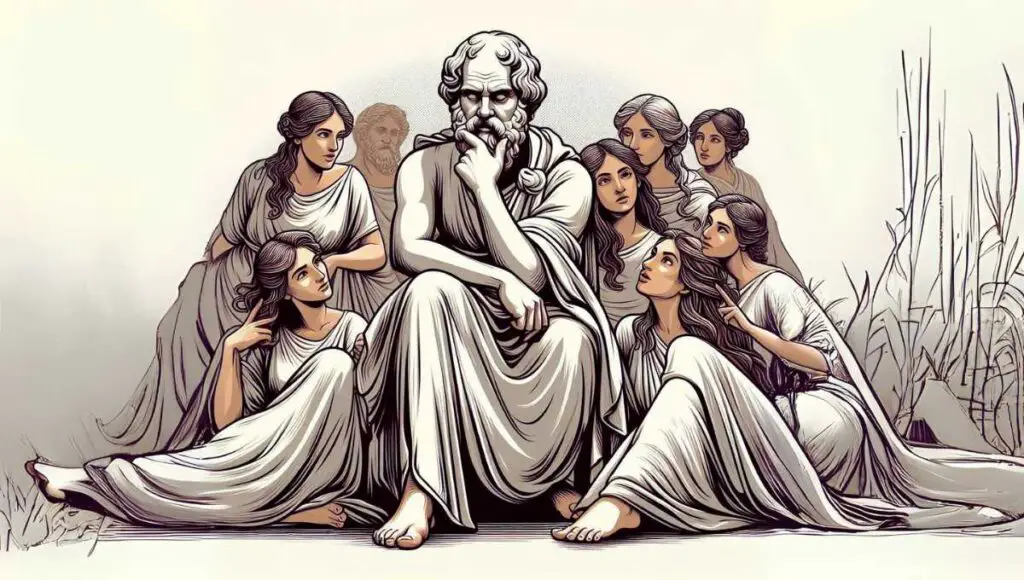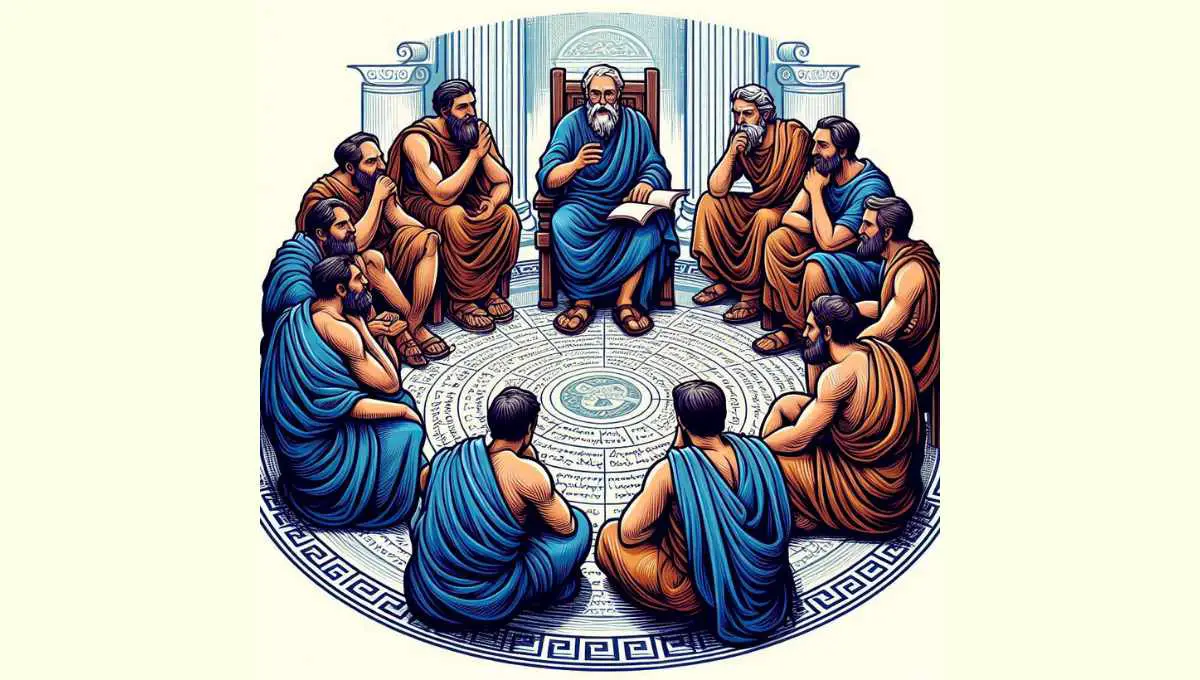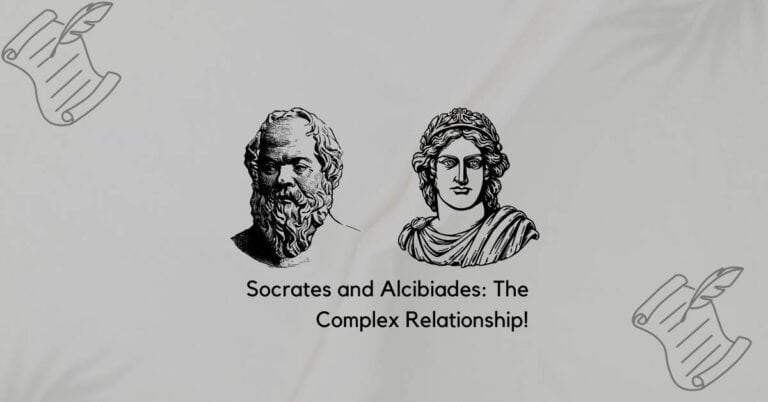Socrates and His Two Wife: Xanthippe and Myrto!
Did you know that the great philosopher Socrates had a colorful personal life? His relationships with women and his close followers reveal a lot about his character.
Socrates, a renowned Greek philosopher, is famous for his contributions to Western thought. He had two known wives, Xanthippe and Myrto, and had intriguing relationships with many people, including his close follower, Alcibiades.
In this blog post, we’ll explore Socrates’ relationships with his wives, Xanthippe and Myrto, and delve into his interactions with women and close followers like Alcibiades. By the end, you’ll gain insight into how these relationships influenced his life and philosophy.
1. Socrates – The Philosopher:
Brief biography of Socrates: Socrates was born around 470 BCE in Athens, Greece, to a stonemason father and a midwife mother. Despite his humble beginnings, he became one of the most influential philosophers in history. Socrates did not write his teachings down; instead, his thoughts and methods were recorded by his students, particularly Plato and Xenophon.
His contributions to philosophy: Socrates introduced a new way of thinking that focused on ethics and human behavior. His Socratic Method, involving asking probing questions to stimulate critical thinking and illuminate ideas, revolutionized philosophical inquiry. Socrates famously declared that “the unexamined life is not worth living,” emphasizing the importance of self-reflection and seeking wisdom. He also challenged the status quo, questioning the moral and societal norms of his time, which ultimately led to his trial and execution.
The impact of his ideas on Western thought: Socrates’ ideas laid the foundation for Western philosophy and influenced countless thinkers, including his student Plato, who went on to teach Aristotle. His emphasis on questioning and dialogue became central to the philosophical tradition. Socrates’ legacy endures in modern education, particularly in teaching methods that prioritize critical thinking and dialogue over rote memorization.
Socrates’ Personal Life
Overview of his personal life: Socrates lived a life of simplicity and intellectual rigor. He often walked barefoot and wore simple clothing, reflecting his belief in living a life focused on intellectual rather than material pursuits. He spent much of his time in public spaces like the Agora, engaging in discussions with anyone willing to converse with him. Despite his philosophical fame, he lived modestly and had a family, including a wife and children.
His relationships with family and friends: Socrates had two known wives: Xanthippe and Myrto. Xanthippe is often portrayed as a shrewish woman, although some accounts suggest this characterization might be exaggerated or unfair. Myrto, his second wife, is less well-documented. Socrates’ relationships with his friends and students were pivotal; he was surrounded by loyal followers who admired his wisdom. Plato, Xenophon, and Alcibiades were among his closest associates, each documenting different aspects of his life and philosophy.
How his philosophical beliefs influenced his personal relationships: Socrates’ commitment to philosophy often affected his personal relationships. His relentless questioning could be challenging for those around him, as he constantly sought to uncover deeper truths. This approach sometimes caused tension, especially with those who were uncomfortable with having their beliefs scrutinized. However, his dedication to seeking wisdom also inspired deep respect and loyalty among his followers. Socrates’ personal interactions were marked by his belief in the value of dialogue and self-examination, which he applied consistently, whether in public debates or private conversations.
In summary, Socrates was not just a philosopher but also a complex individual whose personal and professional lives were deeply intertwined. His commitment to his philosophical principles influenced his relationships and left a lasting legacy that continues to shape Western thought and education.
2. Xanthippe – Socrates’ Most Known Wife:
Who is Xanthippe?
Brief biography of Xanthippe: Xanthippe was the wife of Socrates, one of the most iconic philosophers in history. Born in the 5th century BCE in Athens, her exact birth date remains unknown. She is primarily known through historical texts and anecdotes that often depict her as a sharp-tongued and strong-willed woman. Xanthippe and Socrates had three sons: Lamprocles, Sophroniscus, and Menexenus, indicating that despite their tumultuous relationship, they had a family life typical of their time.
Her background and life before meeting Socrates: There is little detailed information about Xanthippe’s life before her marriage to Socrates. Historical records suggest that she may have come from a relatively well-off family, as her name was common among the Athenian aristocracy. This background might have influenced her expectations and frustrations with Socrates, who lived a life of voluntary poverty and intellectual pursuit, often neglecting conventional family responsibilities.
Common perceptions and myths about her character: Xanthippe has often been portrayed as a nagging and irritable wife, a characterization that has persisted through history. This perception largely stems from anecdotes that depict her scolding Socrates for his lack of practical support and his continuous philosophical engagements. For instance, Plato and Xenophon, both students of Socrates, provide accounts that contribute to this image. However, it is essential to consider that these portrayals might be biased, as they were written from the perspective of Socrates’ admirers, who might have exaggerated her faults to highlight Socrates’ patience and philosophical resilience.
The Marriage of Socrates and Xanthippe
How they met and their early relationship: The details of how Socrates and Xanthippe met are not well-documented, but their marriage likely followed the traditional Athenian customs of arranged marriages. They married when Socrates was already an established figure in Athenian society, dedicated to his philosophical inquiries and known for his unorthodox lifestyle. Their early relationship details are sparse, but it is clear that Xanthippe assumed the role of managing their household, which included dealing with the financial and domestic affairs that Socrates often neglected.
Key events in their marriage: Their marriage was marked by several key events that reflected the tension between Socrates’ philosophical pursuits and Xanthippe’s expectations:
- Socrates’ trial and execution: This was a defining moment in their marriage. Xanthippe’s distress during Socrates’ trial and subsequent execution highlights the personal impact of Socrates’ public life on his family.
- Domestic anecdotes: Various stories depict the everyday challenges of their marriage. For example, the famous anecdote where Xanthippe pours water over Socrates after an argument illustrates the domestic strife they experienced.
Historical accounts and anecdotes about their interactions: Several anecdotes shed light on the dynamics of their relationship:
- The water anecdote: After a heated argument, Xanthippe is said to have poured water over Socrates’ head. Socrates reportedly responded calmly, saying, “After thunder comes the rain.” This anecdote illustrates his composed nature and philosophical detachment in the face of personal conflict.
- Xanthippe at Socrates’ trial: During Socrates’ trial, Xanthippe was reportedly very distressed, to the point where she was removed from the courtroom for being too emotional. This incident underscores the emotional strain that Socrates’ philosophical activities placed on his family.
- Final moments: Historical accounts suggest that Xanthippe was present at Socrates’ final moments, showing her deep, albeit complex, connection to him despite their differences.
In summary, Xanthippe’s life with Socrates was marked by her strong personality and the significant challenges of being married to a man devoted to philosophy over practical affairs. Their relationship, filled with tension and affection, provides a nuanced view of Socrates’ personal life and the impact of his philosophical pursuits on his family. Understanding Xanthippe’s role and their interactions offers valuable insights into the human side of Socrates, beyond his legendary status as a philosopher.
3. Myrto – The Second Wife of Socrates:
Who Was Myrto?
Brief biography of Myrto: Myrto is a relatively obscure figure in the historical accounts of Socrates’ life. Historical evidence about her is scant and sometimes contradictory. Some sources suggest she was the granddaughter of Aristides the Just, an esteemed Athenian statesman known for his fairness. However, these details are not universally accepted, and much about her life remains shrouded in mystery.
Her background and life before Socrates: Very little is known about Myrto’s early life and background. If she indeed descended from Aristides, she likely grew up in a household that valued public service and civic duty. This aristocratic lineage might have shaped her expectations and experiences before her involvement with Socrates. There is no substantial information about her personal life, upbringing, or any previous marriage before Socrates.
Historical accounts of their relationship: The relationship between Socrates and Myrto is not well-documented and is often debated among scholars. Some ancient sources suggest that Socrates married Myrto out of a sense of social obligation rather than romantic love. This notion is based on the idea that Myrto was a widow and that Athenian laws encouraged men to marry widows to ensure their welfare. The scarcity of anecdotes and detailed accounts of their interactions makes it difficult to paint a comprehensive picture of their relationship.
The Marriage of Socrates and Myrto
Circumstances under which they married: The marriage between Socrates and Myrto is believed to have occurred under special circumstances. According to some historical accounts, this union may have been influenced by a law passed during the Peloponnesian War, which aimed to ensure that widows were supported and did not become a burden on the state. This law encouraged men to marry widows and take responsibility for their care. If Socrates married Myrto under this law, it suggests that his motivations were more about social duty than personal desire.
Key events in their relationship: Specific events in the marriage between Socrates and Myrto are not well-documented. The lack of detailed accounts leaves much to speculation. However, considering Socrates’ philosophical lifestyle, their marriage likely involved challenges similar to those faced in his marriage to Xanthippe, such as Socrates’ frequent absences from home and his minimal concern for material wealth and domestic affairs. The dynamics of their relationship might have been less publicly scrutinized, contributing to the sparse historical records.
Comparison with his marriage to Xanthippe: Xanthippe is often depicted as a strong-willed and outspoken woman, frequently clashing with Socrates over his lack of practical support for the family. In contrast, Myrto’s character and relationship with Socrates are much less defined in historical texts. While Xanthippe’s interactions with Socrates are often highlighted in anecdotes and philosophical dialogues, Myrto’s presence is more subdued and less discussed. This contrast reflects the different facets of Socrates’ personal life: Xanthippe’s relationship with Socrates highlights the tension between domestic responsibilities and philosophical pursuits, while Myrto’s marriage might represent a quieter, duty-bound partnership influenced by societal norms.
In summary, Myrto’s role in Socrates’ life is enigmatic, with historical records providing minimal insight into their marriage. The marriage, possibly driven by social obligation, adds a layer of complexity to Socrates’ personal narrative. Understanding Myrto and their relationship, despite the lack of detailed accounts, helps to round out the picture of Socrates’ life and the various relationships that shaped him as a philosopher and a person.
4. Socrates’ Relationships with Women:
Socrates’ Views on Women
How Socrates’ philosophical views influenced his relationships with women: Socrates held progressive views on the intellectual capabilities of women, considering the cultural context of ancient Athens. He believed that women, like men, could possess wisdom and virtue. This perspective influenced his interactions, as he often engaged in philosophical discussions with women, treating them as intellectual equals.
Socratic dialogues involving women and their roles: In Plato’s dialogues, we find instances where Socrates interacts with women. One notable example is Diotima, a priestess and philosopher in “The Symposium.” Diotima is portrayed as a wise teacher who instructs Socrates on the nature of love and beauty, indicating his respect for her intellectual contributions. Another instance is Aspasia, the partner of Pericles, whom Socrates admired for her rhetorical skills and intellect.
Anecdotes and Historical Accounts
Famous stories and dialogues involving Socrates and women: Several anecdotes highlight Socrates’ interactions with women:
- Diotima in “The Symposium”: Socrates recounts his lessons from Diotima, showing her as a knowledgeable and insightful figure. Her teachings on love and the ascent to the divine highlight her philosophical significance.
- Aspasia in Xenophon’s “Oeconomicus”: Socrates discusses household management and the roles of women with Ischomachus, who praises Aspasia’s wisdom. This reflects Socrates’ recognition of women’s intellectual capabilities.
Analysis of what these stories reveal about his views and relationships: These stories reveal Socrates’ belief in the potential for women to contribute to philosophical discourse. His respect for figures like Diotima and Aspasia contrasts with the prevalent Athenian view that women were primarily suited for domestic roles. Socrates’ interactions with these women suggest he valued intellectual merit over gender.
The significance of these anecdotes in understanding Socrates’ character: These anecdotes illustrate Socrates’ commitment to seeking wisdom, regardless of societal norms. By engaging with and learning from women, Socrates demonstrated an inclusive approach to philosophy. This inclusivity not only highlights his progressive views but also underscores his character as a seeker of knowledge from diverse sources.
In summary, Socrates’ relationships with women were influenced by his belief in their intellectual capabilities. Through dialogues and anecdotes, it is evident that Socrates valued and respected the contributions of women in philosophical discussions. These interactions provide a deeper understanding of Socrates’ character and his commitment to the pursuit of wisdom.
5. Dynamics of His Marriages:
Philosophical Differences
How Socrates’ philosophy influenced his marriages: Socrates’ philosophy deeply influenced his approach to marriage. His commitment to a life of questioning and seeking truth often took precedence over practical concerns. This philosophical dedication likely caused friction at home, as his wives had to manage household responsibilities without much support from him. Socrates’ belief in living a life of virtue and simplicity meant that he valued intellectual pursuits over material wealth, which could have been a source of tension.
Views of Xanthippe and Myrto and how they contrasted with Socrates’ beliefs: Xanthippe is traditionally portrayed as frustrated by Socrates’ lack of attention to practical matters. Her perceived nagging may have been a response to the financial and domestic instability caused by Socrates’ philosophical lifestyle. Despite this, she remained with him until his death, indicating a complex relationship marked by both conflict and commitment.
Myrto, on the other hand, remains an enigmatic figure with little documentation about her personal views. If she married Socrates out of societal obligation, her relationship with him might have been more about fulfilling social duties than shared philosophical interests. The lack of detailed accounts about Myrto suggests that her relationship with Socrates may have been less contentious but also less documented due to her quieter role.
Impact on Socrates’ Work
How his marriages influenced his philosophical ideas: Socrates’ marriages provided a real-life context for his philosophical ideas about human relationships, virtue, and self-discipline. His interactions with Xanthippe, in particular, could have influenced his thoughts on managing personal conflicts and maintaining integrity under pressure. The challenges and dynamics of his married life likely offered Socrates practical insights into human behavior, which he could then explore philosophically.
Examples from his works that may reflect his personal life:
- Dialogue in “The Symposium”: Socrates recounts lessons from Diotima, highlighting his belief in learning from others, regardless of gender. This openness to wisdom from all sources could reflect his appreciation for different perspectives, possibly influenced by the strong personalities of his wives.
- Socratic Method: The constant questioning and dialogue Socrates engaged in with his students and peers might reflect his domestic life, where persistent questioning and debate were likely common. His method of eliciting truth through dialogue parallels his need to navigate and understand the complexities of his personal relationships.
In summary, Socrates’ marriages to Xanthippe and Myrto were marked by philosophical differences and practical challenges. These relationships influenced his philosophical inquiries and offered real-life examples of human behavior and interaction. By examining the dynamics of his marriages, we gain a deeper understanding of how Socrates’ personal life intersected with and informed his philosophical work.
6. Socrates and His Close Followers:
Relationship with Alcibiades
Who was Alcibiades? Alcibiades was a prominent Athenian statesman, general, and student of Socrates. Born into a wealthy and influential family around 450 BCE, he was known for his charm, intelligence, and controversial actions. Alcibiades played a significant role in the political and military history of Athens, often switching allegiances and stirring political intrigue.
The nature of Socrates’ relationship with Alcibiades: Socrates and Alcibiades shared a deep, complex relationship that blended mentorship, friendship, and intellectual challenge. Socrates saw great potential in Alcibiades and sought to guide him toward a virtuous and reflective life. Despite their close bond, Alcibiades often struggled to live up to Socratic ideals, indulging in political ambition and personal excess.
Anecdotes and historical accounts of their interactions: One famous anecdote from Plato’s “Symposium” describes Alcibiades bursting into a banquet and delivering a drunken speech in praise of Socrates. He admitted feeling both admiration and frustration toward Socrates, who he described as impervious to physical temptations and worldly pleasures. Another story from Xenophon’s “Memorabilia” illustrates Socrates’ attempts to guide Alcibiades, warning him about the dangers of succumbing to his desires and ambitions. These interactions highlight the tension between Socratic philosophy and Alcibiades’ tumultuous life.
Influence of Close Relationships on Socratic Philosophy
How relationships with followers like Alcibiades influenced Socrates’ ideas: Socrates’ relationships with followers like Alcibiades provided rich material for his philosophical inquiries. These interactions allowed Socrates to explore concepts of virtue, self-control, and the struggle between reason and desire. Through guiding and challenging his followers, Socrates refined his ideas about human nature and the pursuit of a virtuous life.
Examples of dialogues and interactions that highlight these influences:
- Plato’s “Symposium”: Alcibiades’ speech about Socrates offers insight into Socratic teachings on love and self-discipline. Alcibiades’ struggle to reconcile his admiration for Socrates with his own hedonistic tendencies exemplifies the tension between philosophical ideals and personal desires.
- Xenophon’s “Memorabilia”: Socrates’ conversations with Alcibiades often centered on the importance of self-knowledge and virtue. These dialogues illustrate Socrates’ belief in the transformative power of philosophical inquiry and the challenges of living a life aligned with one’s principles.
Conclusion:
We explored Socrates’ personal life, focusing on his relationships with his wives, Xanthippe and Myrto, and his close follower, Alcibiades. We examined how these relationships influenced his philosophical ideas and personal dynamics. Socrates’ interactions with Xanthippe and Myrto highlighted the tension between domestic responsibilities and philosophical pursuits. His relationship with Alcibiades showcased the complexities of mentorship and the struggle to live virtuously.
Understanding Socrates’ relationships provides a richer perspective on his philosophy. It reveals the human side of a legendary thinker, showing how personal experiences and connections shaped his ideas. These stories remind us that philosophy is not just an abstract pursuit but deeply intertwined with the lived experiences and challenges of everyday life.
I encourage you to delve deeper into the lives of philosophers and their personal stories. Reflect on how their relationships and experiences influenced their ideas. Consider exploring works by Plato and Xenophon to gain further insights into Socrates and his world. By connecting with these personal narratives, we can better appreciate the profound impact of philosophy on both personal and intellectual growth.






